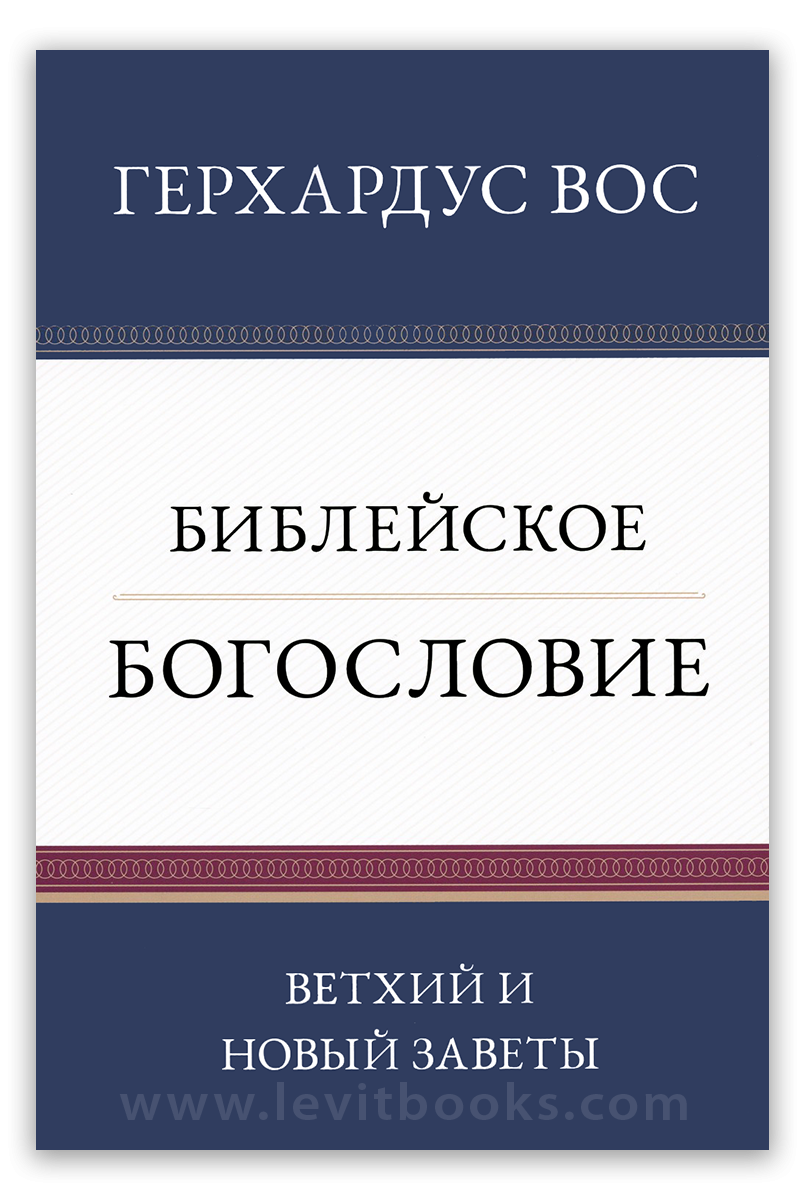
Gerhardus Vos — (1862-1949) was born in the Netherlands and at the age of 19 moved with his family to Grand Rapids, USA. In 1883, Vos entered the Princeton Theological Seminary, knowing, in addition to his native Dutch, German, English, French, Latin, Hebrew and Greek at the time of admission. Later, he received a doctorate from the University of Strasbourg for studies in the field of Arabic language. In 1886 Abraham Kuiper strongly invited the twenty-four-year-old Vos to take the position of professor of the Old Testament at the Free University of Amsterdam, and Herman Bavink - at the University of Kampen. Due to family circumstances, Vos stayed in the USA. In 1892, he became the first professor of biblical theology at Princeton Seminary. His best friends were other Princeton professors: Benjamin Warfield and Woodrow Wilson (the future 28th president of the United States). Warfield once said to their mutual friend Louis Berkhof: "I think he (Vos) is the best exegete of those who taught at Princeton." Gerhardus Vos is considered the founder of the discipline of biblical theology in the Reformed tradition.
-

Biblical theology
Author: Gerhardus VosCategoryDescriptionContentAuthorDetailsIn the list of theological disciplines, biblical theology occupies an intermediate position between exegetics and systematic theology. It differs from systematic theology not by the fact that it is more biblical or more committed to the truths of revelation, but by the fact that the principle of ordering the content of the Bible, which it follows, is historical rather than logical.
Systematic theology considers the Bible as a single whole and strives to present its teaching in its entirety in an ordered, systematic form, while biblical theology interprets its subject from a historical point of view, trying to demonstrate the organic growth, or development, of the truths of personal revelation from the initial, personal revelation that preceded redemption, sent down in Eden, to the completion of the New Testament canon.
Read moreForeword
From the publisher
OLD TESTAMENT
Part 1. The era of Moses' revelation
1. Introduction: the nature and method of biblical theology
Four major divisions of theology
Definition of biblical theology
Different concepts consistently denoted by the term "biblical theology"
Guiding principles
Objections to the term "biblical theology"
The relationship of biblical theology to other disciplines
Method of biblical theology
The practical benefit of studying biblical theology
2. General marking of the field of revelation
Pre-redemptive and redemptive stages of personal revelation
Divisions of redemptive personal revelation
Berith
Diatheke
3. The content of pre-redemptive personal revelation
Four principles
1. The principle of fullness of life: what the symbolism of the tree of life teaches
2. Test: what does the symbolism of the tree of knowledge of good and evil teach
3. The principle of temptation and sin, symbolized by a snake
4. The principle of death, symbolized by the perishability of the physical body
Death and immortality
4. The content of the first-person revelation that announced redemption to a person
Three curses
"Seed"
Human suffering
5. Revelation to Noah and the events that led to this revelation
Siphites and Cainites
Revelation after the flood
6. The era between Noah and the great patriarchs
1. Prophetic sayings of Noah (Genesis 9:20-27)
2.List of peoples
3. Separation of languages (Genesis 11:1-9)
4. Selection of Semites as bearers of revelation and objects of redemption
7. Revelation in the age of patriarchs
Views of the critical school
The historicity of the patriarchs
Epiphany
Angel of Jehovah
Patriarch Abraham
1) The principle of election
2) Objectivity of sent gifts
3) Supernatural performance is promised
The name of God is El Shaddai
Belief in the religion of the patriarchs
Ethical aspects
Patriarch Isaac
Patriarch Jacob
1) Election
2) Dream in Bethel
3) Fight in Penuel
8. Revelation in the era of Moses
AND. The place of Moses in the Old Testament revelation
The outstanding role of Moses
B. The form of revelation in the era of Moses
The pillar is cloudy and fiery
Angel of Jehovah
The name and face of Jehovah
IN. The content of Moses' revelation
1) The historical basis of the Mosaic system established during the deliverance from Egypt
2) Conclusion berith between Jehovah and Israel
3) Organization of Israel: theocracy
4) Decalogue
5) Ceremonial law
Part 2. The era of prophets in the history of revelation
1. The place of prophecy in the Old Testament revelation
The movement that led to the formation of the kingdom
The word as a tool of prophecy
The factor of succession
Two main periods in the history of prophetism
2. The concept of prophetic ministry: terms and their etymology
Hebrew term nabhi
The Greek term prophets
The terms ro, eh and chozeh
3. History of prophetism: critical histories
History of prophetism
The origins of the nabhi-ism movement in Israel
Did the late prophets create ethical monotheism?
4. The method of receiving prophetic revelation
Kuenen's observations
The theory of the core of revelation
The theory of witchcraft
Revelation through speech and listening
Revelation through demonstration and vision
Revelation through rapture
Bodily effects
Internal mental state
Answer to extreme critical views
5. Method of transmission of prophecy
Thing
Miracles
6. The content of the prophetic revelation
AND. The nature and qualities of Jehovah
Monotheism
Prophetic teaching about the nature and qualities of Jehovah
B. The connection between Jehovah and Israel
Hosea's teaching about marriage
IN. Breaking alliances: Israel's sin
Collective sin of the people
Perversion of ritual worship
Social sin
The sin of Israel, considered by the prophets from a historical point of view
G. Judgment and restoration: prophetic eschatology
Views of the critical school of Wellhausen
Eschatological teaching of the prophets
NEW TESTAMENT
1. The character of the New Testament revelation
The new arrangement is final
Should we expect further revelation?
2. Revelation given at Christmas
Aspects of Christmas
3. Revelation associated with John the Baptist
Matthew 11:2-19
John the Baptist and Elijah
Testimony of John the Baptist about Jesus Christ
John's baptism
Baptism of Jesus by John
Descent of the Spirit on Jesus
The testimony of the Baptist about Jesus after His baptism
4. The revelation given during the trial of Jesus
Temptation in the desert
God's temptation and our own temptation
A special form of temptation of our Lord
Interpreting the tempted of the Lord
Subjection to temptation and the ability to sin
5. Revelation through the public ministry of Jesus
AND. Different aspects of Christ's ministry related to revelation
Four parts of the revelation sent through Christ
Revelation about God, sent by Jesus in the Gospels
B. The problem of development
IN. The method by which Jesus presented His teaching
Similarities
Parables in the proper sense
Proverbs-examples
The method of allegory
The philosophy of teaching proverbs
"Real" and "truth" in the Fourth Gospel
G. The attitude of Jesus to the writings of the Old Testament
"Religion of the Book"
Refutation of some critical claims
D. Jesus' teaching about God
The teaching of Jesus about the fatherhood of God
Emphasis by Jesus of divine greatness and grandeur
God's retributive justice
THERE ARE. The teaching of Jesus about the kingdom of God
1) Formal questions
2) The essence of the Kingdom
Biblical index

Gerhardus Vos — (1862-1949) was born in the Netherlands and at the age of 19 moved with his family to Grand Rapids, USA. In 1883, Vos entered the Princeton Theological Seminary, knowing, in addition to his native Dutch, German, English, French, Latin, Hebrew and Greek at the time of admission. Later, he received a doctorate from the University of Strasbourg for studies in the field of Arabic language. In 1886 Abraham Kuiper strongly invited the twenty-four-year-old Vos to take the position of professor of the Old Testament at the Free University of Amsterdam, and Herman Bavink - at the University of Kampen. Due to family circumstances, Vos stayed in the USA. In 1892, he became the first professor of biblical theology at Princeton Seminary. His best friends were other Princeton professors: Benjamin Warfield and Woodrow Wilson (the future 28th president of the United States). Warfield once said to their mutual friend Louis Berkhof: "I think he (Vos) is the best exegete of those who taught at Princeton." Gerhardus Vos is considered the founder of the discipline of biblical theology in the Reformed tradition.
Author Gerhardus VosVendor Евангелие и РеформацияISBN 978-985-7328-15-4Year 2024Cover Hardcover, dust jacketPages count 528Language RussianWeight 975 gSize 170 x 240 x 35QuantityPrice ₴1,200.00dBiblical theology
Regular price ₴1,200.00 UAHRegular priceUnit price / per


















